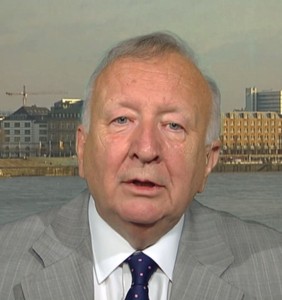Editor’s Note: This feature separates Ukraine’s friends from its enemies. The Order of Yaroslav the Wise has been given since 1995 for distinguished service to the nation. It is named after the Kyivan Rus leader from 1019-1054, when the medieval empire reached its zenith. The Order of Lenin was the highest decoration bestowed by the Soviet Union, whose demise Russian President Vladimir Putin mourns. It is named after Vladimir Lenin, whose corpse still rots on the Kremlin’s Red Square, 100 years after the October Revolution he led.
Bob Corker – Order of Yaroslav The Wise

The U. S. Senate on June 15 passed by a vote of 97–2 amendments to a bill that would lock into law sanctions imposed on Russia for the Kremlin’s aggression against Ukraine.
The bill, S. 722 on sanctions against Iran, now includes wording that would trigger a congressional review process should the administration of U. S. President Donald J. Trump seek to ease sanctions on Russia.
That’s important, as the current administration has never indicated it would take a tough stand against Russia’s aggression against Ukraine, and given every indication that it wants to seek some sort of compromise and rapprochement with the Kremlin and Russian dictator Vladimir Putin.
S. 722 was sponsored by Republican Senator Bob Corker of Tennessee, the chairman of the Senate Foreign Relations Committee, who wins the Order of Yaroslav the Wise this week.
Corker played a key role in drafting the language of the amendment to the bill, and worked closely with U. S. Senate Democratic Leader Chuck Schumer (a close second for the Kyiv Post’s Friend of the Week) to strike the bipartisan deal, which not only locks in the sanctions on Russia for its actions against Ukraine, but would impose new ones for the Kremlin’s human rights abuses, arming of Syria, and meddling in last year’s U.S. presidential election.
The bill now has to be voted on by the U. S. House of Representatives, and will then go to Trump’s desk for signature. Corker believes it is unlikely that Trump would veto a final bill, and very likely there would be enough support in Congress to override any such veto anyway.
“I think the bill is a very, very strong signal to Russia, but it does provide the administration the flexibilities they need to conduct business,” Corker told reporters, according to a report by CNN on June 15. Schumer on June 13, ahead of the Senate vote on, said that “by codifying existing sanctions and requiring Congressional review of any decision to weaken or lift them, we are ensuring that the United States continues to punish President (Vladimir) Putin for his reckless and destabilizing actions.”
That sounds good: as does some of the other language in the bill, which promises “robust assistance” to any European countries that are targeted by Russian aggression via disinformation or attempts to undermine their democracies.
Even better, Moscow is unhappy with Corker’s bill, which Kremlin spokesman Dmitry Peskov on June 13 said was “negative” for Russia.
A negative for Russia is a plus for Ukraine, so Senator Corker is our friend of the week.
Willy Wimmer – Order of Lenin

They say the Germans have a word for everything.
One we hear depressingly often is “Russlandversteher,” meaning “one who understands Russia.” It is most often used ironically — the “understanding” of these people is usually just fawning sympathy.
And it is a word that applies to Christian Democratic Union politician Willy Wimmer, a former member of the German parliament, the Bundestag, and a former vice president of the Organization for Security and Cooperation in Europe’s Parliamentary Assembly.
In an interview with Kremlin propaganda outlet RT on Feb. 14, Wimmer showed he fully understood Moscow’s propaganda line.
On sanctions: “Why does (the European Union) have sanctions against the Russian Federation? There’s no reason,” Wimmer said. He said, absurdly, that the EU imposed sanctions “because of the coup d’etat in Kyiv, which was organized by the West.”
In fact, Ukraine underwent a homegrown revolution, and the reason the EU imposed sanctions on Russia is because the Kremlin annexed the Crimean peninsula, and fomented a war in the Donbas.
On NATO: “NATO is outdated, not only because of the remarks of President Trump that NATO is obsolete,” Wimmer said. “NATO is outdated because the European Parliament, the European population never in history voted for NATO as an aggressive alliance.”
The Kremlin has long sought to undermine NATO and portray it as an aggressor.
And on “victimized” Russia: “I think we have a disastrous situation in the EU, and we’ve faced, for some years, a situation in which (the Europeans) do their utmost to create a hostile situation against the Russian Federation.”
In fact, the EU was initially very slow to respond to Russia’s interference in Ukraine’s internal affairs, imposed minimal sanctions, and appears reluctant to increase them. So for an excess of understanding of the Kremlin’s position, the winner of the Order of Lenin this week is Wimmer.
However, we can in Wimmer’s case allow ourselves some schadenfreude — to use another German word: On June 9 it was reported the Ukraine’s SBU security service had banned the German politician from entering Ukraine for five years. He had illegally entered Crimea in early March with a group of German businessmen and politicians, and met with members of the occupying authorities there.
Perhaps, for one so understanding of Russia, Wimmer should in future also develop an understanding that Crimea is in Ukraine, not Russia. And a better understanding of Ukrainian and international law would not go amiss either.
